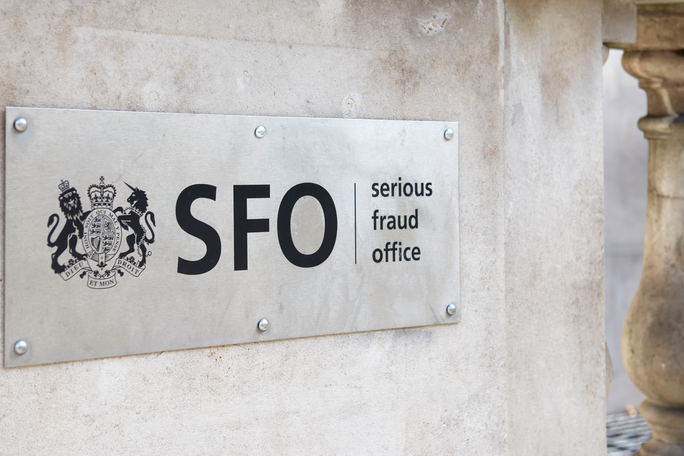The Serious Fraud Office (SFO) is the UK’s flagship law enforcement organization, dedicated to investigating and prosecuting the nation’s most serious fraud and corruption cases. However, its reputation has been severely damaged in recent years, with several high-profile cases collapsing, over what sometimes might be described as schoolboy errors.
As individuals, SFO investigators and prosecutors are hardworking and conscientious – as Tony knows from his days as a UK fraud detective working with them. But they have lacked effective leadership from the top, which in turn has led to these high-profile case failures.
Such has been the lack of leadership, in fact, it is fair to question whether the SFO should be disbanded in its current form and moved under the umbrella of the National Crime Agency, which is the UK’s equivalent of the FBI.
When former senior police officer Nick Ephgrave took over the SFO last September, we welcomed the appointment. Historically the SFO has been lawyer-led, so this change in tack could prove to be the SFO’s salvation. Unfortunately, Ephgrave has inherited several cases and issues not of his making.
Eurasian Corp case
One of these concerns an SFO investigation into Eurasian Natural Resources Corp (ENRC). Following a decision by the High Court in London, the SFO could potentially be liable for a multi-million-pound damages claim, for what the court described as “wrongdoing”, after SFO investigators allegedly encouraged a former Dechert LLP partner to disclose sensitive client information. Dechert’s client in that case was ENRC.
The SFO opened a probe into ENRC in 2013, before closing the investigation 10 years later in August last year, citing “insufficient admissible evidence to prosecute”.
In a judgment issued in the High Court in London in late December, Mr Justice Waksman concluded that “but for the SFO’s wrongdoing” the decision to launch the 10-year criminal investigation “would not have been made”. Meanwhile, the potential value of any ENRC damages claim could be astronomical. It spent $93m defending itself from an SFO investigation and asserts that it lost a further $90m a year as a result of the ensuing investigation, impairing its ability to raise money. The potential compensatory sum is so vast it may even prove terminal to the SFO’s continued existence.
Mr Justice Waksman ruled back in 2022 that, after being tasked with investigating allegations raised by a whistleblower, a Dechert lawyer had passed sensitive information to the SFO. In effect, the lawyer leaked confidential information about his corporate client to journalists and his contacts at the SFO, thereby fomenting a criminal inquiry against his own client. Mr Justice Waksman said the SFO had breached its duties by accepting information from the Dechert lawyer that was “plainly unauthorised” and “against his client’s interests”.
These actions are deplorable, and the lawyer concerned should not only hang his head in shame but also face the ramifications that will surely follow his actions.
The situation also raises many serious questions, including around the mindset of the SFO team in charge of the case: were their actions properly recorded and rationalised? Or were they simply flying by the seat of their pants?
Information exchange
Questions need to be addressed, particularly in relation to the legitimacy or otherwise of the exchange of information between the lawyer and the SFO. For example, was the lawyer registered as a Covert Human Intelligence Source (CHIS) under the Regulation of Investigative Powers Act (RIPA)?
The SFO is an organisation designated under RIPA by the Secretary of State. RIPA defines a CHIS as being:
“A person is a CHIS if:
- they establish or maintain a personal or other relationship with a person for the covert purpose of facilitating the doing of anything falling within Section 26(8)(b) or (c);
- they covertly use such a relationship to obtain information or to provide access to any information to another person; or
- they covertly disclose information obtained by the use of such a relationship or as a consequence of the existence of such a relationship.”
But a lawyer also has duties of confidentiality to their client. So this issue in isolation will require a degree of investigation in its own right, to clarify how the SFO classified its source and managed his professional duties to ENRC.
RIPA specifically highlights the impact of Legal Professional Privilege (LPP), stating:
- “9.57 Where a public authority is seeking a CHIS authorisation where the purpose (or one of the purposes) of the authorisation is to obtain legally privileged material, the application must also contain a statement that the purpose, or one of the purposes, of the authorisation is to obtain legally privileged material (in addition to the other notification requirements provided for in Article 5 of the 2010 Legal Privilege Order).”
From the lawyering perspective, the Solicitors Regulation Authority (SRA) states:
- “The Courts have stated that the duty to preserve confidentiality is unqualified, in that it is a duty to keep the information confidential, not merely to take all reasonable steps to do so. It is not limited to the duty not to communicate the information to a third party. It is a wider duty not to misuse it, ie, without the consent of a client or former client to make any use of it or to cause any use to be made of it by others otherwise than for the client’s benefit. See Prince Jeffrey Bolkiah v KPMG [1998] UKHL.”
- “Confidentiality will attach to all information given to you, by your client or a third party, in connection with the retainer in which you or your firm are instructed.”
Legal privilege
It will be interesting how the SFO manages this particular conundrum: did it consider the information it was receiving to be legally privileged? Either way, it will need to offer an explanation about its rationale for acting the way it did, and its policymaking decisions will need to be evidenced and justified. Judging by the recent rulings, there may be additional such issues demanding clarification.
The judge in December’s case concluded that Dechert was the “principal driver for the wrongdoing and must bear the lion’s share of responsibility”, although the SFO “cannot possibly be described as blameless”.
This is possibly the worst of the SFO’s failures to date. There will be a need for a full inquiry into what went wrong. The CHIS/LPP issue is but a small piece that jumps out from the overall puzzle. The fact that the judge has asserted wrongdoing by the SFO leads one to hypothesise that what is in the public domain may be the tip of the iceberg.
Nick Ephgrave has his work cut out this year. Can he save the SFO in its current format? Time will tell.
Martin Kenney and Tony McClements are Head of Firm, and Head of Investigations, respectively, at Martin Kenney & Co (MKS), an investigative litigation practice based in the British Virgin Islands.

















